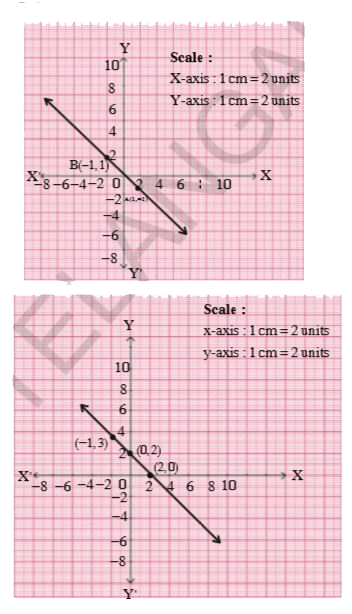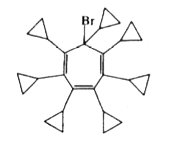For each graph given below, four linear equations are given. Out of these find the equation that represents the given graph.
(i) Equations are
(A) y = x
(B) x + y = 0
(C) y = 2x
(D) 2 + 3y = 7x
(ii) Equations are
(A) y = x + 2
(B) y = x - 2
(C) y = -x + 2
(D) x + 2y = 6
 Solution in Gujrati
Solution in Gujrati
Step by step video & image solution for For each graph given below, four linear equations are given. Out of these find the equation that represents the given graph. (i) Equations are (A) y = x (B) x + y = 0 (C) y = 2x (D) 2 + 3y = 7x (ii) Equations are (A) y = x + 2 (B) y = x - 2 (C) y = -x + 2 (D) x + 2y = 6 by Maths experts to help you in doubts & scoring excellent marks in Class 9 exams.
Updated on:21/07/2023Topper's Solved these Questions
- LINEAR EQUATIONS IN TWO VARIABLES BOOK - NCERT GUJARATICHAPTER - LINEAR EQUATIONS IN TWO VARIABLES EXERCISE - TRY THIS
3 Videos
- LINEAR EQUATIONS IN TWO VARIABLES BOOK - NCERT GUJARATICHAPTER - LINEAR EQUATIONS IN TWO VARIABLES EXERCISE - Do This
2 Videos
- GEOMETRICAL CONSTRUCTIONSBOOK - NCERT GUJARATICHAPTER - GEOMETRICAL CONSTRUCTIONSEXERCISE - EXERCISE 13.2
2 Videos
- LINES AND ANGLES BOOK - NCERT GUJARATICHAPTER - LINES AND ANGLES EXERCISE - THINK, DISCUSS AND WRITE
1 Videos
Similar Questions
Express the following linear equations in the form of ax + by + c = 0 and indicate the values of a, b, c in each case?
(i) 3x + 2y = 9 (ii) -2x + 3y = 6 (iii) 9x - 5y = 10
(iv)x2−y2−5=0 (v) 2x = y
View Solution(i) Draw the graph of following equations.
(a) x = 2 (b) x = –2 (c) x = 4 (d) x = –4
(ii) Are the graphs of all these equations parallel to Y-axis?
(iii) Find the distance between the graph and the Y-axis in each case
View SolutionConstruct △XYZ in which ∠Y=30∘, ∠Z=60∘ and XY + YZ + ZX = 10 cm.
View SolutionWhat is the difference between intersecting lines and concurrent lines ?
View SolutionThe value of |[a,a+d,a+2d] , [a+d,a+2d,a+3d] , [a+2d,a+3d,a+4d]|+|[b
View SolutionIdentify X and Y in the following
H2C∣Br−C∣BrH2+KOHalcohol−−−→XNaNH2−−−−→Y
View SolutionThe correct order of size among Br^(+), Br, Br^(-)
View Solution1) Fragmentation () a) Planaria br 2) Unripe fruits () b) Yeast br 3) Desire () c) Spirogyra br 4) Reproduction () d) Watermelon br
View Solutionవేర్ల ద్వారా శాఖీయోత్పత్తి జరిపే మొక్కbr i) డాలియాbr ii) ముల్లంగిbr iii) క్యారెట్br iv) క్యాబేజిbr
View SolutionComplete the following reactions :
(i) CH3−CH2Br+KOH(aqueous)Boil−−→X+Y
(ii) CH3−CH2Br+NH3→X+Y
View SolutionIdentify X and Y in the following
H2C∣Br−C∣BrH2+KOHalcohol−−−→XNaNH2−−−−→Y
View SolutionFind correct features w.r.t. most advanced type of placentation. Br a. Parietal in Argemone. Br b. Basal in cereals. Br c. Axile in solanaceae. Br d. Unilocular ovary. Br e. Ovary with single ovule
View SolutionOn the basis of the RQ values, arrange the given respiratory substrates in descending order. Br a. Glucose, br b. Oxalic acid , br C. Tripalmitin, br d. Protein
View SolutionWite down the corresponding elements in the figure : 1)……………… br 2)…………… br 3).……………. Br 4)………….. Br 5)…………. Br 6)…………..

View SolutionIn the given compound, will Br ionize in the form of (a) Br^(-) or (b) Br^(+) .
View SolutionIn the given compound, will Br ionize in the form of (a) Br− or (b) Br+.

View Solution
